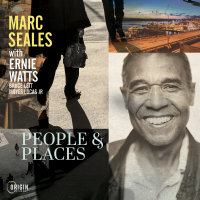Home » Jazz Articles » Scumbles » Jazz in the UK now
Jazz in the UK now
London remains the centre of the revival but not the only hub. Across the UK, more people are going to live gigs and this has helped create one of the most interesting and diverse scenes in the world with room for everyone. It also means the smaller venues have found a market. Audiences have changed and young people are venturing into jazz clubs where they mix easily with the more experienced jazz audience. Musicians talk of a revival in the small club arena and the diversity of the music on offer. As cafes, small venues and bars turn their commercial minds to a wider clientele the scene is more diverse than ever with jazz, blues and other genres benefiting. It is the music which unites audiences and jazz is attracting a more diverse audience. Thankfully, the fact that venues have chosen to follow a more eclectic route means audiences get to see acts whose potential otherwise may never have reached audiences. The ripples created by the thriving scene in London are spreading across the UK. I spoke to several musicians to get their take on things:
Trumpet player
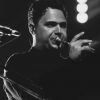
Reuben Fowler
trumpetFowler agrees the mood is encouraging. He says, "I think the scene is constantly changing, and a few people have come up to me and said that they feel there is definitely a wave of new musicians excited about jazz that have breathed new life into the atmosphere. I think there has always been a tradition of new people beginning to do the circuit, which raises the bar of musicianship and attracts new audiences. I know that the arrival of trumpet players

Kenny Wheeler
flugelhorn1930 - 2014

Guy Barker
arrangerb.1957
Gerard Presencer
flugelhornb.1972

Kit Downes
keyboardsb.1986

Chris Montague
guitar, electric
Joshua Blackmore
drumsb.1986
Fowler is also aware of the growing enthusiasm away from the capital. "I did a lovely gig in Bristol at the Bebop Club with some old friends." He says, " The audience was mainly middle-aged I'd guess with a few younger and older members. Revisiting my hometown jazz club in Wakefield, I feel lucky thinking I was exposed to music in this environment. Although it is a mixed audience, it's full of people of all ages who are all really into music. I think if the scene is changing and becoming younger, it can only be a good thing.I think it's great there's loads of young people around at the moment like trumpet player Laura Jurd and drummer Jonathan Silk who all have something new to say on their instruments."
Drummer and percussionist
Pedro Segundo
percussion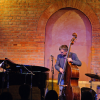
James Pearson
piano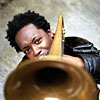
Dennis Rollins
tromboneb.1964
Saxophonist Dave Lewis is an American but now lives in the UK. He leads his seven piece band '1UP' and has also toured and recorded throughout the States, Europe and Japan, and made numerous TV, radio and video appearances. Dave has played with
John Martyn
b.1948
Eric Clapton
guitar and vocalsb.1945
Nothing can be taken away from the importance of small venues like Ryans Bar in Stoke Newington where free players can often get a showcase in their FlimFlam events. Musicians can play to a full house but also the landlord will not kick them out if there are only three or four in the audience. Bigger venues are diversifying and offering different musical talent a space to play. One consequence has been they have got younger people into gigs. The scene has taken on an energy which only youth can bring. Sometimes, success can mean it becomes more difficult for musicians just breaking into the scene to get a gig but the growth of places promoting much more free music, as well as trendy venues that are popping up, is very healthy. London is proving a magnet for players. Saxophonist Peter Brötzmann, for example, used to play London once in a while but now he seems to be there almost monthly. Brotzmann himself has said that in Europe it was once possible to set off on the road and play for two weeks at small venues dotted across the countries but now it is harder and you have to travel long distances between gigs in Europe but the UK and especially London is still attractive. Small venues have opened or re-opened across the capital. Examples include The Luna Lounge, in Leytonstone, The Forge, Camden, Hideaway, Streatham , Pizza Express Jazz Club, on Dean Street and the 606 Club, SW10. Kings Place, York Way, N1, is where you can catch freeform, amongst a range of art offerings. Saxophonist

Mats Gustafsson
woodwindsb.1964

Derek Bailey
guitar1932 - 2005

Lol Coxhill
saxophone, sopranob.1932

Steve Beresford
piano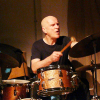
Roger Turner
drums
John Butcher
saxophoneb.1954
Tenor saxophonist Mussinghi Brian Edwards was a member of the
Jazz Warriors
band / ensemble / orchestraAlan Weekes
guitar, electric
Soweto Kinch
saxophone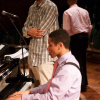
Reuben James
keyboardsAway from London venues across the UK such as Jazz at the Albert in Bedminster, Bristol, and Manchester's Band on the Wall offer opportunities to musicians. Snape Maltings in Suffolk, traditionally a home for classical music, is more open to jazz and other genres now. Players like

Andy Sheppard
saxophoneb.1957
However, what of the future? What about funding which Gustaffson and others mentioned? I spoke to double bassist

John Edwards
bass, acousticDouble and electric bassist

Yaron Stavi
bass, acousticNigel Kennedy
violin
Gilad Atzmon
saxophoneOn funding Stavi says, "There are definitely differences between the funding methods in the UK and Europe. I am not an expert on the subject but as a touring musician who plays very often around Europe and obviously in the UK I see more funding for jazz but also for music and arts in general in Europe than in the UK. The funding is both public and private. I see many more sponsors and supporters of jazz in Europe than in the UK. I see that support in many festivals and venues around Europe. I know that venues and festivals around the UK struggle and sometimes even have to stop because of lack of funds. I don't know if this is going to change in the near future. There are, obviously, also a lot of good people and institutions who are doing great things such as Jazz Services and so on but I guess there is still more to do before the UK jazz scene will live up to its potential."
Saxophonist and composer Renato D'aiello plays in the UK, France, Italy, Germany, Finland, Norway, Malta and Japan. For the past three years he plays every Monday night upstairs at Ronnie Scott's. He says , "the jazz scene in London is very lively. The UK scene is very healthy and people are definitely enjoying jazz more and more and the standard of players is becoming higher every year. There are a lot of places where young and less young musicians can play starting from pubs, restaurants, Jazz venues, colleges, village halls and festivals. There are also a lot of foreign musicians in London which a very positive thing. In terms of funding there is a big difference between UK and France or Italy (where there is no funding whatsoever). Musicians in France appear more able to concentrate on their projects, because there is funding in the form of an ongoing monthly award for artists called "Intermittance" which is non-existent in the UK and Italy. In the UK we also have some great organizations like Jazz Services which helps support touring bands and there are also other funding schemes supported by the National Lottery but this funding is difficult to access ."
The jazz scene in the UK has come back to life and with a vengeance. Much is down to the nature of the audiences. Saxophonist Evan Parker commented recently, "It is an amazingly strong and diverse scene that seems to thrive on adversity. The cultural authorities have been ignoring it for the past twenty years, and hoping it would die of starvation; but they have not reckoned with the determination of people to follow their hearts. We play in a very connected way—maybe too connected but the audience seem to appreciate it."
Edwards comments, "Music has always been the antithesis of political power— jazz maybe more so and free jazz even more. The establishment maybe want to keep people drugged up with the banal, working, doing the same thing. Maybe free music upsets that." He also feels live music definitely has a future. " We are all hard wired to gather together. It is the group thing. We thrive in groups and nothing can recreate live gigs....... Certainly in our culture the thing of some people being on stage playing and some listening is all part of the event. It is about all of us, how we get along."
Singer

Barb Jungr
vocalsb.1954
Saxophonist

Davey Payne
saxophoneb.1944
In the UK, funding is still vital in keeping the art alive but we just do not seem to have the funds available elsewhere whilst in Europe there seems to be more funding available from federal and private sources. Perhaps some of the media companies could step in and help, take a stance, make finding available or perhaps our government need to put more funds into the arts so the potential we undoubtedly have here stays in the UK. There seems to be a lack of funding specifically at grassroots levels and an attitude of letting small venues try to compete with mass market venues offering same old same old in musical terms. If there is nothing down to stop the funding pools drying up, musical potential in the UK is in danger of drifting overseas and we should not let that happen.
With thanks to: The musicians who gave their thoughts and time. Namely Reuben Fowler, Yaron Stavi, Peter Brotzmann, Mats Gustafsson, Mussinghi Brian Edwards, Renato D'aiello, Peter Haughton, Evan Parker, Dave Lewis, John Edwards, Barb Jungr and Pedro Segundo.
Tags
Comments
PREVIOUS / NEXT
Support All About Jazz
 All About Jazz has been a pillar of jazz since 1995, championing it as an art form and, more importantly, supporting the musicians who make it. Our enduring commitment has made "AAJ" one of the most culturally important websites of its kind, read by hundreds of thousands of fans, musicians and industry figures every month.
All About Jazz has been a pillar of jazz since 1995, championing it as an art form and, more importantly, supporting the musicians who make it. Our enduring commitment has made "AAJ" one of the most culturally important websites of its kind, read by hundreds of thousands of fans, musicians and industry figures every month.


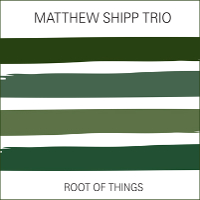
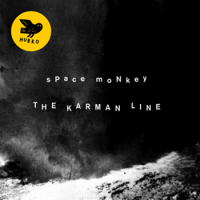



 Buy Now
Buy Now



